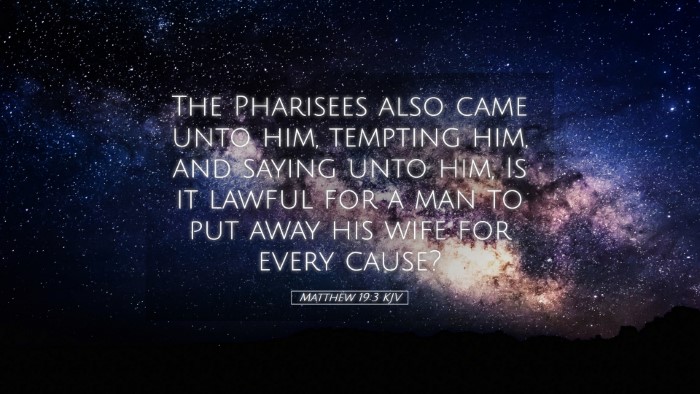Commentary on Matthew 19:3
Matthew 19:3 states: "And the Pharisees came unto him, tempting him, and saying unto him, Is it lawful for a man to put away his wife for every cause?" This verse serves as a crucial juncture in the narrative of Jesus' ministry, revealing not only the cultural context but also the theological implications behind the topic of divorce.
Context and Background
The inquiry posed by the Pharisees reflects the contentious atmosphere surrounding the Mosaic Law and the understanding of permissible grounds for divorce. The Jewish society was deeply influenced by a variety of rabbinical interpretations, primarily those of Hillel and Shammai, which often diverged significantly. Hillel’s more lenient approach allowed divorce for nearly any cause, while Shammai's stricter view limited it to serious transgressions.
Insights from Matthew Henry
Matthew Henry highlights the intent behind the Pharisees' question, suggesting that they sought to trap Jesus in a theological quandary. Henry elaborates:
- “Their aim was to bring Him into contention with the law of Moses or the customs of the Jews.”
- He emphasizes the disposition of the Pharisees to use religious debate not for understanding but for entrapment.
Henry notes that the phrase "tempting him" indicates that the inquiry was not sincere. Instead, they were trying to ensnare Jesus with His own words, similar to the way Satan tempted Him in the wilderness.
Albert Barnes' Perspective
Albert Barnes provides a detailed analysis of the question posed. He asserts that the timing and context of the question are significant. Barnes states:
- “The law permitted divorce, but it had become an abuse,” referring to the common practice in which men too readily divorced their wives.
- He also draws attention to the cultural implications of this practice, suggesting that it often led to the marginalization of women.
Barnes further remarks on the moral and spiritual degradation that resulted from the lax attitude toward divorce prevalent among the Pharisees and the community at large.
Reflections from Adam Clarke
Adam Clarke brings a deeper theological insight to the comment. He reflects on Jesus’ response, which is delineated in the subsequent verses. Clarke points out that:
- “Jesus redirects the conversation from the legal to the spiritual, emphasizing the sanctity of marriage.”
- He argues that Jesus’ intention was to restore the original intent of God in creation regarding marriage.
Clarke underscores that genuine marriage, as instituted by God, transcends legal definitions and societal norms. He emphasizes:
“From the beginning, it was not so,” implying that deviation from God's design is the true source of marital strife.
Theological Significance
This verse and the ensuing discourse are pivotal in Christianity’s understanding of marriage and divorce. It invites consideration of several key themes:
- The Authority of Scripture: The necessity of grounding marital ethics in biblical teaching rather than cultural practices.
- Divine Intent: A reaffirmation of the intended purpose of marriage as a covenantal relationship.
- Grace and Redemption: Recognizing the compassion of Jesus toward those affected by divorce and the hope for redemption.
Concluding Thoughts
Matthew 19:3 invites pastors, students, and theologians to engage deeply with issues of marriage, divorce, and the heart of Jesus’ teachings. It serves as a challenging reminder to adhere not only to the letter of the law but also to the spirit of God's design for relationships, emphasizing love, fidelity, and mutual respect.
As we ponder the implications of this scripture, let us seek to embody the grace of Christ in our interactions and counsel regarding marriage, reflecting His will and character in a world often fraught with misunderstanding and division.


